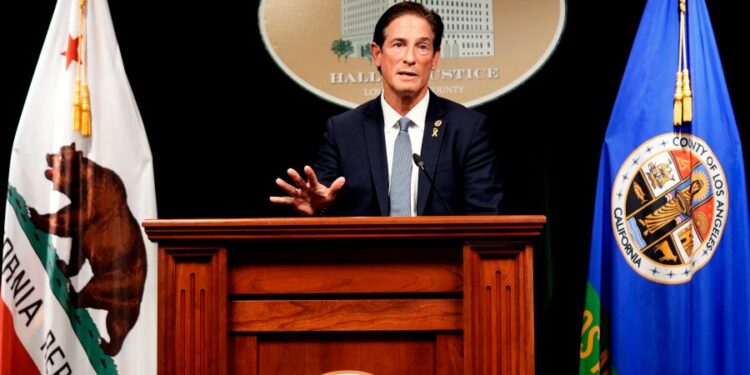After Los Angeles District Attorney Nathan Hochman cast doubt over new evidence in the Menendez brothers’ trial, potentially limiting their path to being released from prison, legal analysts agree that their chances of seeing freedom are slim.
The brothers’ case was swung wide open last October when then-D.A. George Gascón announced that his office would reexamine the case in light of the new evidence, which included a letter alleging sexual abuse purportedly written by Erik Menendez just months before he and his brother, Lyle, murdered their parents in Beverly Hills in 1989.
The brothers were 21 and 18 at the time.
Since Gascón announced the reopening of the case, he lost his reelection bid to Nathan Hochman, and the new D.A. is not as sure on the brothers’ status; after he won in November, the D.A.-elect spoke with KTLA and was vague on his stance.
“Here’s my approach, whether it’s the Menendez case or, quite honestly, any case, you have to do the hard work,” he told KTLA on Nov. 6. “You have to look, in that case, at thousands of pages of confidential prison files, you have to review thousands of trial transcripts from months-long trials and you have to speak to the prosecutors, law enforcement and the defense counsel … and the victims’ families.”
“Only then can you be in a position to determine whether resentencing is the remedy in this situation or whether what is asked for in the resentencing is the appropriate request,” Hochman continued. “I’m not in that position now, but I can tell you if I do have to make that call, I will do the hard work to make the right decision.”

On Friday, however, Hochman declared that “the court should deny the current habeas petition by the Menendez brothers,” saying that he believes the letter written by Erik Menendez alleging the abuse by his father, Jose, should have been presented at the original trial, and the fact that it wasn’t is “inconceivable.”
“[The letter was] never discussed in any of the two trials,” Hochman said. “We believe it’s inconceivable … and defies common sense, that if they had evidence that would show that sexual abuse had been communicated not just six years before the events, but nine months before the 1989 killings, then it would have absolutely come out.”
Speaking to KTLA on Sunday, criminal defense attorney and legal analyst Alison Triessl, who attended high school with Erik Menendez, stated that Hochman’s recommendation against the brothers’ habeas petition — a separate legal challenge from their resentencing request — is a “legal setback.”
“Although he didn’t specifically say he was opposed to resentencing, [Hochman] indicated that his office’s position is that the Menendez brothers are to remain in prison for the entirety of their sentence,” Triessl said.

The hearing on their resentencing, which is scheduled for March, will focus on Lyle and Erik’s rehabilitative efforts while in prison and other factors, but their fates will ultimately be decided by a judge.
“A lot of the decision making will be thrust upon a Van Nuys Superior Court judge who will review both sides and make a decision on whether or not the Menendez brothers should be resentenced,” Triessl explained. “I’m skeptical that this judge will go against the District Attorney’s Office and release these two men who were convicted of premeditated murder of both their parents.”
Other paths towards freedom, including being released on parole or asking for a pardon from the Governor — the latter of which the brothers have already done — likely won’t “yield the results they want,” Triessl said.
“I do believe [this is it] for them … I don’t think that [they will be able to] overcome the burden they have to overcome,” she added. “I think the judge may very well say, ‘A lot of people have made rehabilitative efforts … that doesn’t guarantee you should be released’.”






